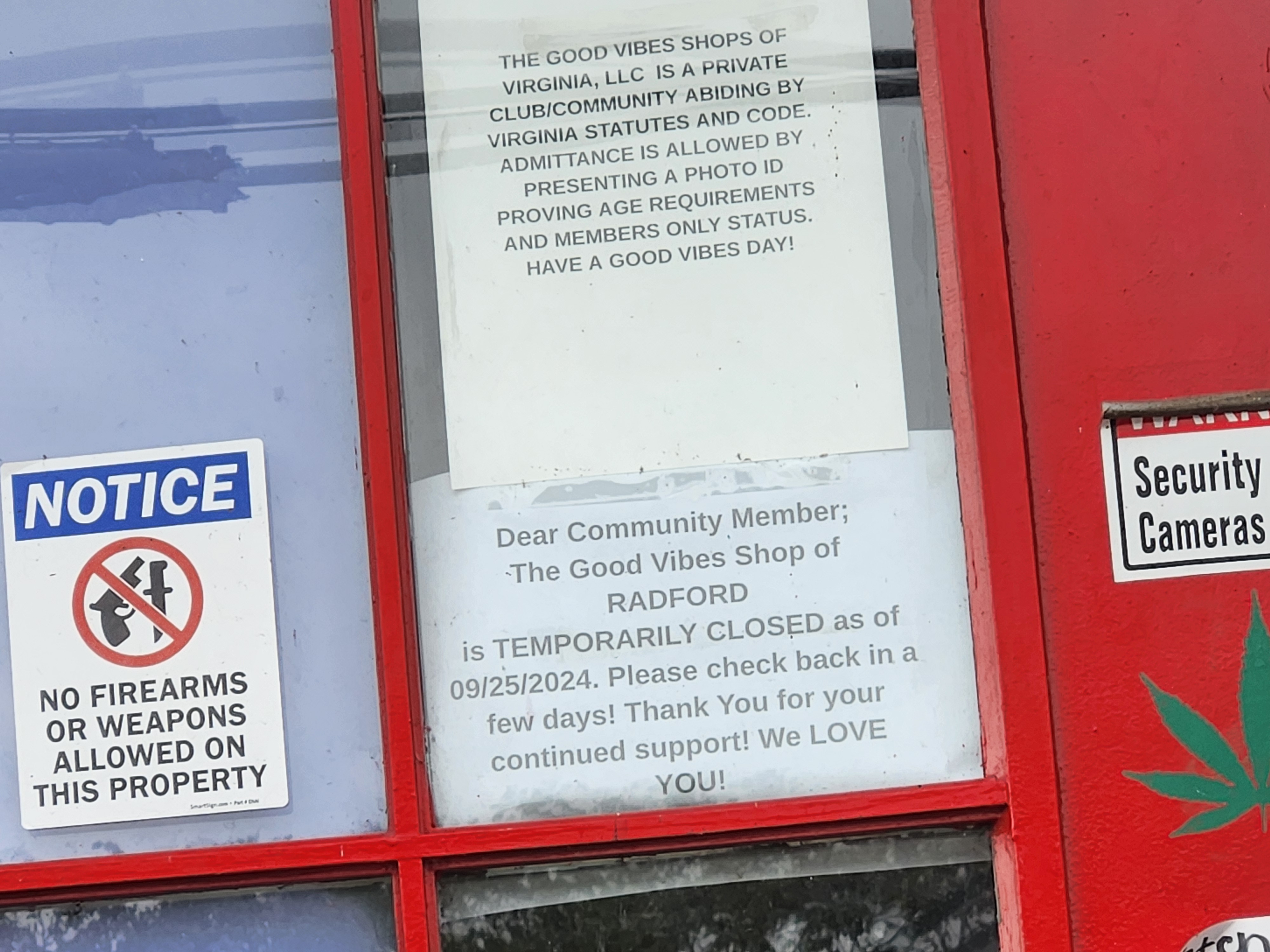Confused about Virginia’s marijuana laws? See our FAQs.
Attorney General Jason Miyares appears to have succeeded in shutting down, at least temporarily, a Radford store that has been “sharing” marijuana with customers who pay for a small amount of legal hemp.

Now he’s sent warning letters to two other stores in Southwest Virginia that have been selling marijuana to “members.”
This is all a consequence of Virginia’s unique — some would say ill-considered — position toward cannabis that has encouraged the black market of marijuana sales to move out into the open.
Virginia is the only state where it’s legal to possess small amounts of cannabis (the preferred name these days for what we used to call pot, weed, the devil’s lettuce, jazz cabbage and lots of other things) but it’s illegal to sell the stuff. That’s opened the way for some to explore the gray area in between. All across Southwest Virginia we’ve seen stores popping up that sell marijuana in some way.
Some were set up as “adult share” stores, where if you bought a product — a T-shirt, a hat, a sticker — for an inflated price, the store would “share” marijuana as a “gift.” Miyares issued an opinion that such “sharing” constituted a sale and is illegal. Last year, a police raid shut down many of those; search warrants show that state and federal investigations are underway into suspected money laundering.
Since then, some of those stores have reopened and others have sprung up in addition to them. In August, Cardinal’s Susan Cameron reported that there are at least nine such stores in Bristol alone. I’ve personally visited others in Abingdon, Marion and Bristol and made purchases which I’ve written about in Cardinal, and which appear to have led to Miyares’ enforcement actions.
The current guise for many of these stores is that they claim to be private “membership clubs,” although I wrote in my previous columns that the so-called the membership application sometimes consists of every customer who enters the store being given a “membership card.”
At each of the three stores I visited, and made purchases, Cardinal had the product tested. Each time, the test showed the green leafy material was most definitely marjuana. After the Radford purchase, we had a more extensive test done, and that showed the weed was also close to exceeding the legal limits for metals and microbes that have been set for the state’s legal medical marijuana. And the smidge of legal hemp I purchased to qualify for this “gift”? It was deemed an essentially worthless packet of what might be waste product from legal hemp.
In September, Miyares sent a letter to that store, advising the Good Vibes Shop that “it has come to our attention” that the store was selling products with tetrahydrocannabinol (the compound, more popularly known as THC, that causes the “buzz”) above the legal limit. Interestingly, Miyares’ letter wasn’t based on an alleged violation of drug laws; the attorney general doesn’t have the power to enforce the state’s cannabis laws. Instead, Miyares’ letter cited consumer protection laws, which he does have the power to enforce. Specifically, his letter cited the lack of proper labeling on the package and the lack of a child-resistant container. He threatened fines of up to $5,000 per violation if the store didn’t “cease and desist” by Sept. 26.
A sign posted in the window of the store now says it closed “temporarily” on Sept. 25. Phone calls and emails to the store have gone unanswered. 
Last week, Miyares sent two more letters to the Zarati Shop stores in Abingdon and Marion; Cardinal obtained those this week. Both say the same thing the previous letter to the Radford store did. “It has come to our attention” that both stores are selling products with illegal levels of THC — but the real problem is the labeling and packaging. Both stores are given until Oct. 18 to stop or face fines.
The Marion store has no phone number listed; phone and email messages left with the Abingdon store have not been returned.
I can’t help but notice that Miyares’ letters have gone to stores where I made purchases and published the results of our tests. His office has declined to comment, but it sure looks as if he’s a Cardinal reader.
The big question isn’t what happens to these three stores but whether these warning letters are sufficient to deter a whole industry that’s springing up outside the law — and whether any of this will change the current politics of cannabis in Virginia.
The Democratic-controlled General Assembly passed legislation (with only a few Republican votes) earlier this year to set up a legal retail market for cannabis — a market that would be licensed, taxed and regulated to make sure consumers know they’re actually getting cannabis and not something full of mold, metals and microbes. Gov. Glenn Youngkin vetoed that bill, saying he didn’t want “a cannabis shop on every corner.” Despite the governor’s intentions, we have something close to that now, at least in Southwest Virginia. Back in the summer, I spoke to the Rotary Club in Floyd County. Rotarians commented on the cannabis columns I’d written and told me that at least three stores in their county were openly selling cannabis.
Open sales of weed are here, no matter what the law says. Will Miyares be able to make such examples of these three stores that others close up? Or will the General Assembly eventually pass a legalized retail bill that the next governor, whoever he or she may be, will sign? We’ll know more about the former in the coming months. We won’t know the latter until 2026.
The politics of storm relief

I write a weekly political newsletter, West of the Capital, that goes out Friday afternoons at 3 p.m. This week I’ll deal with:
- The politics of storm relief
- Which of Virginia’s members of Congress is rated the most collaborative with the other party? Which ones rates the least collaborative? A new report has the rankings.
- Meet the candidate who readers are looking up the most in our Voter Guide.
- Meet the candidate who calls herself “the crazy cat lady” and how pets fit into her campaign platform.
You can sign up for that or any of our other free newsletters below:





